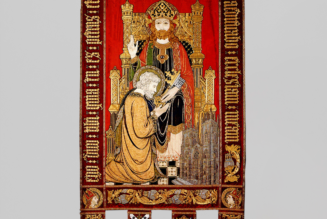 Note: This is the second of a two-part series. Part one is available here.
Note: This is the second of a two-part series. Part one is available here.
At its root, anthropology considers what human beings are and how they have interacted with one another and the world around them over time. While many think of anthropology as a secular study of cultures from ancient to modern day, I propose that there is also a Christian anthropology, one that considers who and what the human person is based on God’s revelation in His word and through our bodies. Indeed, our body is a revelation from God, and by and through it He teaches us.
This essay (consisting of both today’s and yesterday’s posts) is not a complete discourse on the topic. Rather, I selected certain teachings rooted in Scripture and the nature of our bodies that apply particularly well to moral issues of our day. In yesterday’s post we considered a few basic points; today we conclude with a few more.
Each human being exists because of a sovereign, loving act of God.
It is a biological fact that a unique human being comes into existence at the moment of conception. The DNA in that single-cell embryo contains all the instructions needed for it to develop, over the next twenty years or so, into an adult.
However, Scripture indicates that although we come to exist at a specific moment in time, God has always known and loved us: The word of the Lord came to me saying, ‘Before I formed you in the womb I knew you’ (Jer 1:4-5). Scripture also praises God saying, For You formed my inmost being; You knit me together in my mother’s womb. I will praise You, for I am fearfully and wonderfully made (Psalm 139:13-14). Hence, each of us is specifically intended by God.
This makes every human life sacred. No form of unjust killing can be justified under any circumstances. Each of us is the result not merely of biological processes or human decisions but a sovereign, loving act of God. Our lives come from God and belong to Him. Therefore, abortion, murder, and suicide (including physician-assisted) are grave evils that we must combat. Even capital punishment must be opposed except in rare cases.
Our body is not our own.
A common assertion today is we can do whatever we like with “our own body.” However, Scripture reminds us, You are not your own; you were bought at a price. Therefore, glorify God with your body (1 Cor 6:19-20). Yes, Jesus redeemed us; He purchased our salvation at the price of His own blood and His own life!
Hence, our bodies are not tools to simply use as we please. Neither are they canvases on which to display tattoos, cuttings, piercings, and the like. We are not to degrade them by using them for excessive or illicit pleasures or to lure others into sin. I do not wish to divert this post into a debate about tattooing and piercing. While such things are not wholly excluded by Church law or Scripture, anything that deliberately, dramatically alters the appearance of the body we received from God is surely problematic. (The nearly permanent quality of such alterations is also concerning.) Such excesses are far too common today, at least in the U.S.
Because our bodies belong to God, we should ask ourselves, “Is God pleased with the way I regard, treat, and make use of the body He has given me?”
There is a nuptial meaning to the body.
We do not exist by ourselves nor only for ourselves. We are contingent beings and, as such, depend on our parents for our existence. Although we exist for our own sake and thus have intrinsic worth, we also exist for others. Our very body speaks to the most fundamental relationships of marriage and family. Simply put, there is a part of our body that is for another. The male and female reproductive organs are designed for each other. This is biologically evident, though sadly some have lost their way and refuse to acknowledge it.
The denial of the purpose of our body’s reproductive organs is manifest in the approval of homosexual practices that “close the sexual act to the gift of life [and] do not proceed from a genuine affective and sexual complementarity” (CCC # 2357). It is also manifest in certain heterosexual practices that close the sexual act to the fruit of life and/or use the sexual organs in disordered ways, ways in which they were not intended to be used.
To restate, there is a nuptial meaning to the body. Our body says to us, “I am for another.” Most of humanity realizes this truth through monogamous marriage. A man leaves his father and mother, seeks a wife, clings to her, and the two become one flesh (cf Gen 2:24). Thus, through the husband and wife, completing and complementing each other, a new member of the human family is created. This is the most common realization of the nuptial meaning of the body.
For priests and for religious brothers and sisters who live celibate lives, the nuptial meaning of the body is realized in a spiritual but real way. Religious sisters are espoused to the Lord, the bridegroom of their souls. Priests and religious brothers take up a spousal relationship with the Church, the bride of their souls. Priests and brothers are not bachelors nor are sisters “single women.” No, each lives in a spousal relationship.
What about members of the laity who never marry? Here, I would argue, a distinction must be made. Because there is a nuptial meaning to the body, there is no vocation to the single life per se. However, those who are currently single (including those who may remain that way permanently), may by that state be available to serve the Lord and the Church or community in a more substantial way. For such individuals, the nuptial meaning of the body is expressed through that vocational service.
Marriage has its structure because children both need and deserve the stable presence of their father and mother in their lives.
God did not design marriage arbitrarily. He set it forth as one man for one woman till death do them part, bearing fruit in their children (see Genesis 2:24-25). He did this because that is what is necessary and best for children. Marriage by its nature is oriented to having children. The Lord’s first command to Adam and Eve was, Be fruitful and multiply, fill the earth and subdue it (Gen 1:28).
Obviously, there must be a father and a mother for a child to exist at all, but beyond the conception of children there is the necessary work of raising them. Children need to have their parents reliably present in their everyday lives so that they can depend on them and trust them. Further, a child needs a father to learn the masculine genius of being human and a mother to learn the feminine genius of being human. This is necessary for the proper and best human formation—psychologically, spiritually, and emotionally. Even an unbeliever should be able to see this. The structure of marriage is not an arbitrary arrangement by God for us to toy with at will.
Sadly, we have done just that. We casually separate what God has joined. God intends for children to be conceived in the sexual union of a husband and wife pledged to each other for life. Having sex and having children are inextricably linked to Holy Matrimony, yet today we have largely separated them. As a result of minimizing the relationship between sex and marriage, there are many marriages without children (by choice) and many children without parents married to each other. We do this through sins and misbehavior such as fornication, adultery, divorce and “remarriage.” The current practice of refusing to favor a married heterosexual couple over a single mother, a single father, or a same-sex couple when placing a child for adoption also severs what God has joined. As a result of all these things, fewer than half of children today grow up in a traditional family.
While children might lose their mother or father through death, to intentionally subject them to anything other than being raised by their own parents is a grave injustice.
The common objection to this teaching is this: “Are you saying that a single mother, a single father, or a homosexual couple cannot raise a child just as well as a married (heterosexual) couple?” The answer is, “Yes, that is exactly what we are saying,” for all the reasons stated above. Some will respond with horror stories that occurred with this or that traditional couple, but atypical occurrences do not alter general norms, and “hard cases make bad law.”
God intends sex, marriage, and children to go together. Having sex naturally leads to having children; this is biologically demonstrable.
Sex, intimacy, and procreation belong together and should not be separated.
Contraception, the artificial prevention of conception that naturally results from human sexual intercourse, is an attempt to sever the connection between sexual relations and having children. Even if not every act of sexual intercourse can result in a child, the bodily truth is that sexual intercourse is directed toward having children. That sex is also pleasurable and may be a sign of love and intimacy does not set aside this point. God joins pleasures to the things that are most necessary for us so that we do not neglect them. For example, the purpose of eating food is to nourish the body. It is also true that eating is pleasurable and sharing meals promotes camaraderie. This does not, however, mean that the primary purpose of food is something other than bodily nourishment. God joins pleasure to food because eating is necessary for our survival, thus they are to be together, not separated.
As an analogy, consider a person who was not particularly interested in the nutritional aspect of food, but rather just liked the pleasure of eating and/or keeping company at feasts. As a result, he would eat and drink to excess, vomit it all up, and then return for more. We all wince at such a horror. This is because eating has a purpose that is being trampled upon in favor of lesser aspects. The proper end, bodily nourishment, is subverted when a person eats to excess and merely for pleasure.
This is precisely what contraception does when it severs the relationship between sex, intimacy, and procreation. We would be similarly aghast at a couple who had sex without any love between them, merely for the purpose of making babies for profit (e.g. selling them for adoption or for use as laborers). This makes the same point: sex, intimacy, and procreation belong together and should not be divided as separate pursuits. Every child deserves to be the fruit of the intimacy and shared love of a stably married father and mother.
Contraception facilitates the violation of the norm Let no one separate what God his joined (see Matt 19:6). The legalization of contraception in the U.S. has led to the explosion of promiscuity and all of the accompanying woes, including sexually transmitted diseases, teenage parents, children raised in single-parent households, and the horror of abortion, which has become the “contraception of last resort.” All of this has gravely harmed or even killed millions of children. Some argue that it is perfectly fine to separate the procreative dimension of sex from its pleasure or its promotion of intimacy, but in separating what God has joined we have reaped a harvest of misery and death. Contraception promotes the exaltation of the pleasure and intimacy of sexual intercourse unmoored from its purpose: the serious business of having and then raising children within a stable marriage. The worship of pleasure and intimacy unmoored from their purpose has led to the unbridled lust we see today.
There will always be more to say about Christian anthropology, but allow the points made in today’s and yesterday’s posts to paint the bigger picture: God has set forth an understanding of the human person both in Scripture and through our very body and soul. We do well to take heed of what He teaches.
[embedded content]
Cross-posted at the Catholic Standard: Basics of Christian Anthropology (part 2 of 2)









